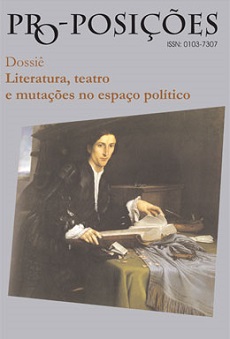Resumo
Este artigo tem por objetivo discutir a relação entre os intelectuais e a política no período que sucede a queda do regime comunista de Nicolae Ceausescu na Romênia em meados de 1989. Após longo período de censura, alguns intelectuais retornaram à cena política e firmaram-se publicamente exercendo papéis diversos. Assim, observa-se um primeiro momento onde predominam as profecias intelectuais; um segundo, caracterizado por uma vida associativa intensa e pela apropriação de recursos internos e externos como medida para assegurar aos intelectuais uma nova identidade coletiva; um terceiro, quase simultâneo, de politização intensa da vida intelectual; e um quarto, mais recente, onde se impuseram os intelectuais midiáticos e os especializados. O Grupo de Diálogo Social (GDS), foco deste estudo, é particularmente representativo dos efeitos das lutas para a definição de um novo estatuto dos intelectuais e teve papel marcante neste processo.
Abstract:
This article is aimed at discussing the relation between intellectuals and politics after the fall of Nicolae Ceaucescu’s comunist regime in Romania in 1989. After a long period of censorship, some intellectuals were back into the political scene and restarted their working lives with different public activities. This way, there was a first moment when intellectual prophecies were very common; then, a second one, marked by intense associative activities and the use of internal and external resources to ensure a new collective identity to intellectuals. Soon after that, there was a period of intense political consciousness, and a fourth and more recent one, when the mediatic and specialized intellectuals were able to impose their prestige. The Social Dialogue Group (Grupo de Diálogo Social, or GDS), which is the focus of this study, represents the effects of all the fight for the definition of a new intellectuals’ statute and has played a very important role in this process.
Key words: Romania. Intellectuals and politics. International circulation. Sociology
Referências
GHEORGHIU, Mihaï Dinu. Conspiration et désenchantement: les conditions d’une nouvelle production idéologique en Roumanie. Les Temps Modernes, 613, mars-avril-mai 2001, p.161-172.
GHEORGHIU, Mihaï Dinu. Les “centres d’excellence” en sciences humaines et sociales et leur insertion dans les communautés scientifiques émergeantes en Europe de l’Est. Perspectives roumaines. Du postcommunisme à l’intégration européenne. (Sous la direction de Catherine DURANDIN, avec la collaboration de Magda CARNECI). Paris: L’Harmattan, 2004, p.139-162.
GHEORGHIU, Mihaï Dinu. Os “centros de excelência” em ciências humanas e sociais e sua inserção nas comunidades científicas emergentes do Leste Europeu. Pro-Posições, Revista Quadrimestral da Faculdade de Educação – Unicamp, v.16, n.2 (47), maio/ago 2005, p. 219-242.
GHEORGHIU, Mihaï Dinu (ed.). (Em colaboração com Lucia DRAGOMIR). Littératures et pouvoir symbolique, Paralela 45, 2005.
HANKISS, Elemér. Brillant ideas or brillant errors?, in Three Social Science Disciplines in Central and Eastern Europe. Handbook on Economics, Political Science and Sociology (1989- 2001), edited by Max KAASE and Vera SPARSCHUH, Social Science Information Center (IZ) Berlin / Collegium Budapest, 2002, p.17-24.
KONRAD, Gyorgy. Le trio logique. Apolitismes – Tumultes, n.8. Paris: L’Harmattan, septembre 1996, p.163-169.
MARGOLIN, Jean-Louis; WERTH, Nicolas. Retour sur le communisme d’Etat. Le Monde, 2 février 2006 [artigo sobre a resolução condenando os “crimes des régimes communistes” adotado pela Assembléia parlamentar do Conselho da Europa].
MINK,George; SZUREK, Jean Charles. La Grande Conversion. Paris: Seuil, 1999.
RUNCEANU, Camelia. Les intellectuels et la recomposition de l’espace public roumain après 1989. Le cas du Groupe pour le dialogue social. Mémoire de master sous la direction de Daniel Barbu, Ecole Doctorale en Sciences Sociales, Université de Bucarest, juin 2004.
TILLY, Charles. Les révolutions européennes 1492-1992, 1993. Trad. franc. Paris: Editions du Seuil.
TISMÅNEANU, Vladimir. Reinventarea politicului. Europa Råsåriteanå de la Stalin la Havel [La réinvention du politique. L’Europe orientale de Stalin à Havel], Iasi, Polirom, 1997.
VOICU, George. Zeii cei rai [Les dieux méchants], Iasi, Polirom, 2000.
A Proposições utiliza a licença do Creative Commons (CC), preservando assim, a integridade dos artigos em ambiente de acesso aberto.

